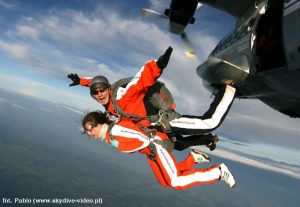Time perception during tandem skydive


Last modified: 02-03-2021
The stories of people who during traumatic events seemed that time slowed down or stopped are well known. There are not many scientific studies that investigate the issue, but several scientists investigated this phenomenon in the lab. They showed among other that while viewing a stressful film about a bank robbery, the respondents were under the impression that time was running slower than it was in reality. It also turned out that neither stimulating music, or caffeine does not alter the perception of time. A disadvantage of testing under laboratory conditions is impossibility to examine the perception of time under extreme stress. Leah Campbell and Richard Bryant from the University of New South Wales examined therefore an assessment of the time in people who first performed skydiving in tandem. According to research by other scientists they hypothesized that the greater fear will feel tandem passenger, the longer the skydive will last, according to him, and the more he will feel the excitement – the shorter skydive will last for him.
The researchers gave questionnaires to fill out 76 people. Before skydive they had to mark on the scale how much they feel the fear and how much thay are excited, and 30 minutes after landing they marked how much they were scared and excited during tandem jump and wrote how much time according to them had passed since the dress to jump to landing. According to the hypothesis, the assessment of the length of skydive was significantly positively correlated with the level of fear before and during parachute jump and significantly negatively correlated with the level of excitement during the jump. The duration of the skydive according to responders was also negatively correlated with the level of excitement before jumping, although in this case the correlation was negligible.
Although the study confirmed the hypothesis that fear makes sense that time passes more slowly, and excitement – on the contrary, according to the researchers, this phenomenon requires further study. Psychologists from the University of Australia did not investigate, the mood of tandem passengers before the jump, and humor could also have impact on the perception of time. They also did not recommend jumpers to take off watches, therefore it is not known whether their assessment of the time was just a subjective feeling, or maybe they looked at his watch before and after the jump. The researchers also did not measure how long actually jump lasted, so they can not check how much the assessment of the passengers is different from the actual time.
References
Campbell L. A., Bryant R. A. (2007). How time flies: A study of novice skydivers, Behaviour Research and Therapy, 45.
Author: Maja Kochanowska






Add comment